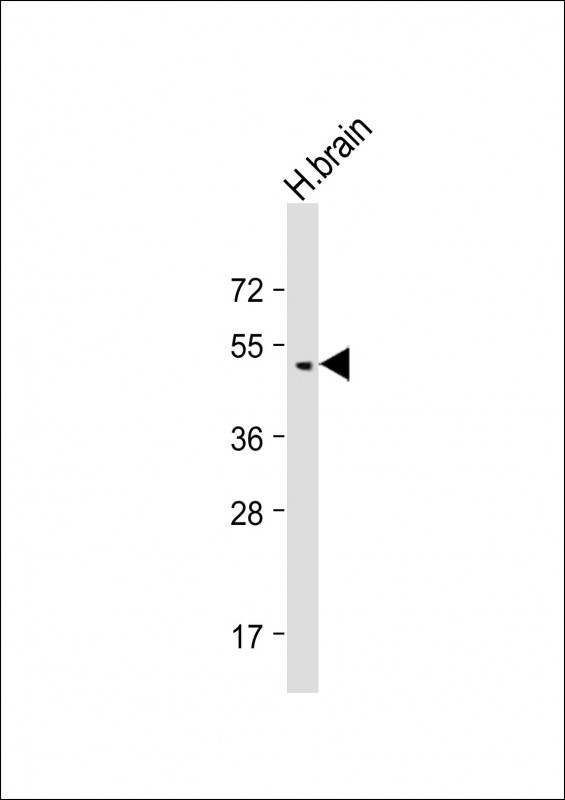
| WB | 咨询技术 | Human,Mouse,Rat |
| IF | 咨询技术 | Human,Mouse,Rat |
| IHC | 咨询技术 | Human,Mouse,Rat |
| ICC | 技术咨询 | Human,Mouse,Rat |
| FCM | 咨询技术 | Human,Mouse,Rat |
| Elisa | 咨询技术 | Human,Mouse,Rat |
| Aliases | Bone morphogenetic protein 8B, BMP-8, BMP-8B, Osteogenic protein 2, OP-2, BMP8B, BMP8 |
| Entrez GeneID | 656 |
| WB Predicted band size | 44.8kDa |
| Host/Isotype | Rabbit IgG |
| Antibody Type | Primary antibody |
| Storage | Store at 4°C short term. Aliquot and store at -20°C long term. Avoid freeze/thaw cycles. |
| Species Reactivity | Human, Mouse |
| Immunogen | This BMP8B antibody is generated from a rabbit immunized with a KLH conjugated synthetic peptide between 332-364 amino acids from the human region of human BMP8B. |
+ +
以下是关于 **ERVK-9/HERV-K抗体** 的参考文献及简要摘要:
---
1. **文献名称**:*Antibody response to HERV-K Env in patients with multiple sclerosis*
**作者**:Antony JM, et al.
**摘要**:研究检测了多发性硬化症(MS)患者血清中针对HERV-K(包括Env蛋白)的抗体水平,发现与健康对照组相比,MS患者抗体滴度显著升高,提示HERV-K可能与自身免疫反应相关。
---
2. **文献名称**:*Human endogenous retrovirus K (HERV-K) Env-specific T-cell and antibody responses in amyotrophic lateral sclerosis*
**作者**:Mameli G, et al.
**摘要**:该文献分析了肌萎缩侧索硬化症(ALS)患者对HERV-K Env蛋白的免疫反应,发现部分患者血清中存在特异性抗体,可能参与神经退行性病理过程。
---
3. **文献名称**:*HERV-K-specific antibodies as potential biomarkers in breast cancer*
**作者**:Wang-Johanning F, et al.
**摘要**:研究探讨了乳腺癌患者中HERV-K抗体的表达,发现其与肿瘤进展和预后相关,提示HERV-K抗体可能作为癌症诊断或治疗的潜在标志物。
---
4. **文献名称**:*The role of human endogenous retroviruses in autoimmune diseases*
**作者**:Balestrieri E, et al.
**摘要**:综述了内源性逆转录病毒(包括HERV-K亚型)在自身免疫疾病中的作用,总结了HERV-K抗体在类风湿性关节炎和系统性红斑狼疮中的检测结果及其可能的致病机制。
---
**注**:ERVK-9是HERV-K家族的一个亚型,相关研究多集中于HERV-K整体或Env/Gag蛋白,上述文献涵盖其抗体在疾病中的潜在应用及机制。如需具体文章细节,建议通过PubMed或Google Scholar检索标题或作者名获取全文。
ERVK-9 antibody targets antigens associated with endogenous retrovirus group K member 9 (ERVK-9), a subtype of human endogenous retroviruses (HERVs) integrated into the genome through ancient retroviral infections. HERVs, including the HERV-K family, constitute approximately 8% of human DNA and are typically silenced but may reactivate under pathological conditions. ERVK-9 is linked to transcriptional activity in certain cancers, autoimmune disorders, and neurological diseases.
Antibodies against ERVK-9 are primarily used in research to study HERV-K expression and its role in disease. For instance, HERV-K proteins, including envelope (Env) and Gag, are implicated in tumorigenesis, neuroinflammation (e.g., ALS, multiple sclerosis), and immune dysregulation. ERVK-9 antibodies help detect viral-like particles or HERV-K proteins in tissues, serum, or cerebrospinal fluid, serving as potential biomarkers.
Recent studies highlight HERV-K reactivation in cancers (melanoma, germ cell tumors) and neurodegenerative disorders, suggesting its contribution to inflammation or genomic instability. ERVK-9 antibodies also aid in exploring therapeutic strategies, such as blocking HERV-K pathways or developing vaccines. However, challenges remain in distinguishing pathogenic HERV-K activity from non-functional elements. Ongoing research aims to clarify ERVK-9's biological significance and its utility in diagnostics or targeted therapies.
×